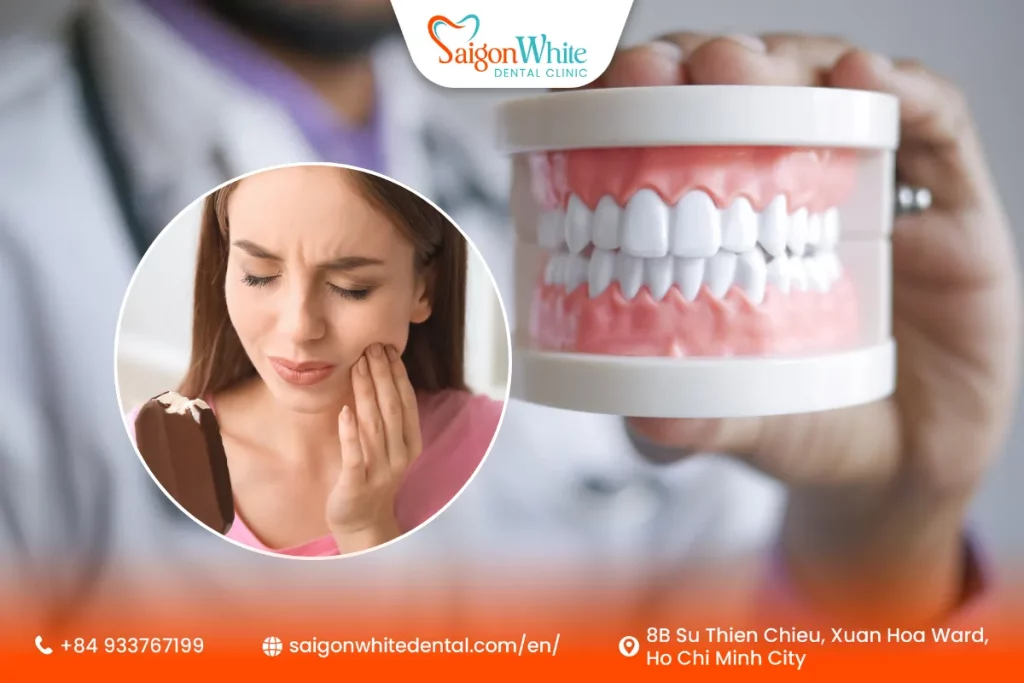If you’ve ever experienced a sharp, tingly, or aching sensation after a dental cleaning, you’re not alone. Tooth sensitivity after cleaning is quite common — and in most cases, completely temporary. Still, understanding why it happens and how to relieve it can ease your concerns and help you enjoy the benefits of clean teeth with confidence.
This article explores what causes tooth sensitivity after cleaning, how long it lasts, when to be concerned, and what you can do about it.

What Is Tooth Sensitivity?
Tooth sensitivity, also known as dentin hypersensitivity, is a condition where the teeth react to certain stimuli, such as:
- Hot or cold foods and drinks
- Sweet or acidic items
- Brushing or flossing
- Touch or air exposure
It occurs when the inner layers of the tooth (dentin) become exposed, allowing external triggers to reach the nerves inside your teeth.
Dentin is typically protected by enamel on the crown and cementum on the root. When this protective layer is compromised or thinned, the tiny tubules inside dentin become pathways to the nerve, triggering discomfort or pain.
Is Tooth Sensitivity After Cleaning Normal?
Yes—mild, short-term sensitivity after a professional teeth cleaning is common and usually nothing to worry about. It typically lasts 24–72 hours (occasionally up to 5–7 days) and is often due to:
- Plaque/tartar removal, exposing previously covered areas
- Gum inflammation or recession (roots are naturally more sensitive)
- Exposed dentin from enamel wear or pre-existing sensitivity
- Cold water/air and instruments used during the procedure
When to call your dentist
Seek a check-up if you notice any of these:
- Sensitivity lasts longer than a week or keeps getting worse
- Sharp, throbbing, night-time pain (not just brief zingers)
- Swelling, pus, fever, or bad taste/odor
- Pain when biting (possible crack, decay, or high filling)
Quick ways to ease the sensitivity
- Use a desensitizing toothpaste (e.g., potassium nitrate, stannous fluoride) twice daily
- Warm salt-water rinses 2–3×/day (½ tsp salt in a cup of warm water)
- Avoid very hot, cold, or acidic foods/drinks for 24–48 hours
- Brush gently with a soft-bristle toothbrush
- Ask your dentist about a fluoride varnish or remineralizing gel if you’re prone to sensitivity
How to prevent it next time
- Regular cleanings (don’t let tartar build up)
- Start a desensitizing toothpaste 1–2 weeks before your appointment
- Use fluoride mouthwash daily
- Avoid aggressive brushing, acidic snacks/drinks, and unmanaged bruxism (consider a night guard)
Common Causes of Tooth Sensitivity After a Cleaning

There are several reasons why your teeth may feel more sensitive after visiting the dentist — and most of them are not harmful.
Let’s look at the top causes:
Plaque and Tartar Removal
During a cleaning, the dental hygienist or dentist uses specialized tools to remove plaque and tartar (calculus) from your teeth, especially near the gumline and between teeth.
Tartar often acts like a “shield” over sensitive areas. Once it’s removed, those parts of the tooth are suddenly exposed to temperature, air, or brushing, which can trigger sensitivity.
Think of it like taking off a jacket on a windy day — your body feels the cold more intensely at first, but eventually adjusts.
Gum Recession or Inflammation
If you have gingivitis or early-stage periodontal disease, your gums may be slightly pulled away from the tooth, exposing the tooth roots.
Unlike the enamel-covered crown, the root surface (cementum) is thinner and more vulnerable. After a cleaning, your gums may feel:
- Sore or swollen
More exposed than usual - Extra sensitive to hot or cold
Deep cleanings (scaling and root planing) can temporarily increase this sensitivity, especially if the roots have been cleaned thoroughly.
Exposed Dentin
Dentin exposure is a major contributor to tooth sensitivity. It can be caused by:
- Enamel erosion from acidic foods or brushing too hard
- Teeth grinding (bruxism)
- Aging
- Gum recession
- Existing cavities or cracks
A thorough cleaning may stimulate these areas or wash away substances that previously coated them — leading to short-term sensitivity.
Pre-Existing Sensitivity
If your teeth are already sensitive before your appointment, cleaning may intensify the sensation for a short time.
Many patients don’t even realize their teeth are sensitive until plaque or tartar is removed and the underlying issues are revealed.
Use of Cold Water, Air, or Dental Tools
Dental professionals often use:
- Cold water to rinse
- Air jets to dry the teeth for inspection
- Metal tools to clean between tight areas
These can trigger nerve response in sensitive teeth, especially if the enamel is thin or the gum coverage is low.
Fluoride Application (Rare Cases)
In some cases, fluoride varnish or gels applied after cleaning may cause mild irritation or a tingling feeling — particularly if gums are already inflamed. This is rare and usually resolves within a few hours.
How Long Does Tooth Sensitivity After Cleaning Last?

For most people, sensitivity:
- Starts a few hours after cleaning
- Peaks within 1–2 days
- Subsidies are completely within 3–5 days
However, the duration may vary depending on:
- The extent of plaque/tartar buildup
- Whether deep cleaning or scaling/root planing was done
- Pre-existing enamel or gum conditions
- How often do you get dental cleanings
If sensitivity continues beyond a week, or if the pain worsens, it’s time to consult your dentist.
When Is Post-Cleaning Sensitivity a Concern?
While temporary discomfort is normal, certain signs suggest something more serious:
Red Flags to Watch For:
- Sharp, throbbing, or radiating pain
- Pain that worsens over time
- Swelling, bleeding, or signs of infection
- Pain that keeps you up at night
- Difficulty chewing or sensitivity that prevents eating
These could indicate:
- A cavity or deep decay
- A cracked tooth
- Gum infection
- Exposed tooth nerve
- A loose filling or crown
If in doubt, don’t ignore the pain — it’s better to get a professional opinion.
How to Relieve Tooth Sensitivity After Cleaning
Most sensitivity can be treated at home with simple adjustments. Here’s how to manage it:
Use Desensitizing Toothpaste
- Brands like Sensodyne or Colgate Sensitive Pro-Relief help block pain signals from reaching the nerve
- Use twice daily for consistent relief
- Look for ingredients like potassium nitrate or stannous fluoride
Avoid Hot, Cold, or Acidic Foods
- Skip coffee, ice cream, citrus, soda, or spicy dishes for 24–48 hours
- Stick to lukewarm, soft foods like oatmeal, eggs, or bananas
Rinse with Salt Water
- Mix ½ teaspoon of salt in warm water
- Rinse gently 2–3 times a day to soothe irritated gums
Use a Soft-Bristled Toothbrush
- Brush gently with circular motions
- Avoid hard brushing that can further wear down enamel or irritate gums
Apply Fluoride Products
- Use fluoride mouthwash or gels at night
- Ask your dentist about fluoride varnish if sensitivity is frequent
Use a Mouthguard If You Grind Your Teeth
- Nighttime grinding (bruxism) contributes to enamel wear
- A custom mouthguard can reduce future sensitivity and protect your teeth
How to Prevent Tooth Sensitivity After Future Cleanings
Here are proactive steps you can take before your next cleaning:
- Brush twice daily with fluoride toothpaste
- Floss daily to prevent tartar buildup
- Visit your dentist regularly (every 6 months or as advised)
- Avoid acidic or sugary foods that erode enamel
- Use sensitive toothpaste at least a week before your appointment
If you’ve experienced sensitivity in the past, let your hygienist or dentist know ahead of time. They can:
- Use warmer water during cleaning
- Apply numbing gel to sensitive areas
- Apply fluoride varnish after the cleaning for protection
Conclusion
Experiencing tooth sensitivity after a dental cleaning is common — and usually nothing to worry about. The sensation is often a temporary response to plaque removal, exposed dentin, or gum changes, and it usually goes away within a few days.
The good news? Cleanings are one of the best things you can do for your teeth. With the right home care and professional guidance, you can reduce post-cleaning discomfort and enjoy the benefits of a cleaner, healthier smile.
Protect Your Smile for Life – Start with a Professional Cleaning!
Ready for a fresher, healthier smile? At Saigon White Dental, we offer gentle and professional teeth cleaning that removes stubborn plaque, brightens your teeth, and helps prevent gum disease. Whether it’s your first visit or part of your regular routine, our caring team is here to make your experience comfortable and effective.
👉 Book your appointment today and give your smile the care it deserves!

 Book now
Book now